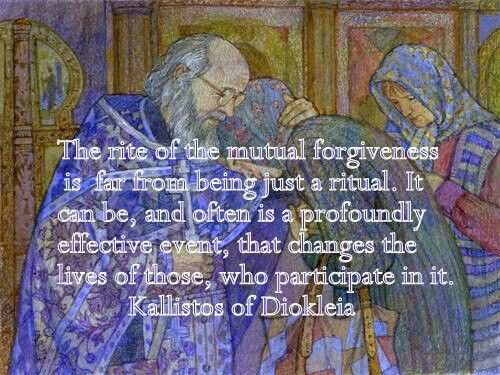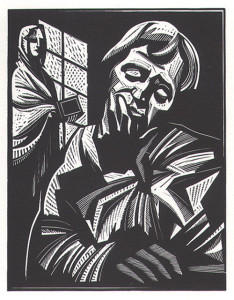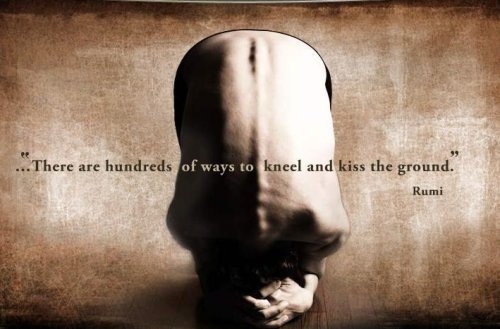This coming Sunday is known as “Cheesefare Sunday” or “Forgiveness Sunday” in the Orthodox Church. It’s the day before “Clean Monday,” the official start of Great Lent. Our parish (and many others) has a tradition of asking and giving forgiveness to everyone during the service called Forgiveness Vespers. We actually thread around the outside of the nave facing each person and saying “Please forgive me” and receiving the words “God forgives and I forgive” or something similar, followed by a hug. And then the process continues until everyone present has exchanged a very physical, verbal and spiritual kiss of peace. (Read a nice article about this service by Frederica Mathewes-Green here.)

Each year my experience at Forgiveness Vespers is very different and very personal, marking spiritual landmarks in my life. I can remember evenings many years ago when I was so distraught over my sins that I fell prostrate on the floor in front of several people, asking their forgiveness during this rite. That’s not a reflection on my piety, but truly a gift from God that was needful at the time. But I can also remember at least one year, and maybe more, when I didn’t go to Forgiveness Vespers, intentionally avoiding the opportunity to give forgiveness. I was withholding it from certain people, and so I entered the Lenten season with a hard heart. I don’t ever want to do that again.
And yet I will miss the communal kiss of peace at St. John Orthodox Church this coming Sunday, as I’ll be at the beach with a friend. I don’t think I’m running away—the dates of our trip just happened to conflict with the beginning of Lent. But forgiveness is always a messy venture for me, and perhaps for others. It’s not cut and dry, black and white, one and done. It’s a process.
Father Stephen Freeman writes about it in a recent blog post, “Forgiveness—the Hardest Love of All.” One of his suggestions really hit home to me:
Do not struggle in a small way but throw yourself into forgiveness.
Throw yourself into forgiveness. He’s speaking specifically about forgiving people who have hurt us or those we love and haven’t acknowledged that wound. They haven’t asked for forgiveness. I can see how one can only achieve this by God’s grace and throwing ourselves into it. How can we do that?
 In another post, Father Stephen writes about the advice given to Raskolnikov, the axe-murderer in Crime and Punishment. Sonya the prostitute tells him:
In another post, Father Stephen writes about the advice given to Raskolnikov, the axe-murderer in Crime and Punishment. Sonya the prostitute tells him:
Go now, this minute, stand in the crossroads, bow down, and first kiss the earth you’ve defiled, then bow to the whole world, on all four sides, and say aloud to everyone: ‘I have killed!’
The spiritual concept of each of us taking responsibility for the sins of the world—in imitation of Christ—comes into play with Sonya’s advice. Perhaps I will find the grace to hear her words and act on them while I’m at the beach this Sunday, as Father Stephen says:
We take a burden far greater than Raskolnikov’s into Great Lent. Bow down, kiss the earth you have defiled, then bow to the whole world, on all four sides, and say aloud: “Forgive me!”

Maybe I’ll make those bows on the beach. Or maybe I’ll make them in the privacy of my heart, or with acts of kindness that God makes available to me in the coming weeks of Great Lent. As Rumi says, “There are hundreds of ways to kneel and kiss the ground.” One of my favorite music CDs is Kris Delmhorst’s “Strange Conversation.” I especially love “Everything is Music,” (adapted from Rumi) where she says:
Stop talking now, open up the window
The one right there in the middle of your heart
Give us your hands, sit down in this circle
You know you got no need to keep yourself apartToday you wake up sad and empty, don’t go back to sleep.
There’s a million ways to kneel and kiss the ground.